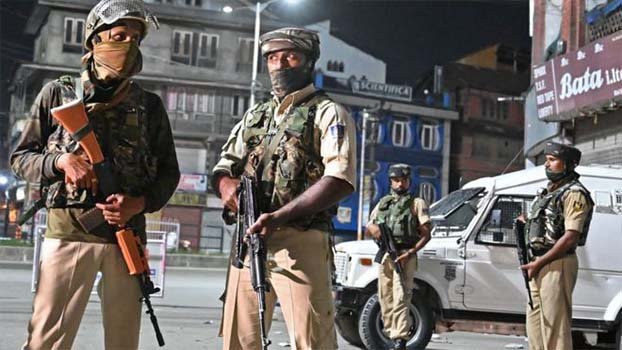Jammmu and Kashmir divided scraping status of state

At the stroke of midnight on Wednesday, Jammu 1 has ceased to be a state and became India’s newest federally-ruled territory which gives Prime Minister Narendra Modi’s federal government direct control to run its affairs.
On August 5, the Modi government announced its decision to scrap Jammu and Kashmir’s status as a state and split into two separate territories including Ladakh.
Addressing an event in Ahmedabad in his home state Gujarat on Thursday morning, Modi said Jammu and Kashmir and Ladakh “are taking a step towards a new future.”
“Our decision on Jammu and Kashmir is not to draw a line on the land but to build a chain of trust,” he said.
He said the country decided to scrap Article 370 which had only given Jammu and Kashmir separatism and terrorism.
The Indian government also withdrew Jammu and Kashmir's decades-old special status under the Constitution’s Article 370 whose abrogation has been a key ideological plank of ruling Bharatiya Janata Party.
The Indian Home Ministry, in a notification on Wednesday, replaced the state of Jammu and Kashmir with the "union territory of Jammu and Kashmir" and announced omission of "permanent residents or hereditary state subjects".
In the late night notification, the Ministry's Jammu and Kashmir division announced a slew of measures, including application of federal laws. "... there are references in the state laws that have been applied to the Union Territory of Jammu and Kashmir, and the Union Territory of Ladakh to the expressions 'permanent residents' or 'hereditary state subjects'..., wherever they occur, shall be omitted," it said.
The birth of the two new federally-ruled territories came on a day when India is marking the 144th birth anniversary of its first Home Minister Vallabhbhai Patel who is credited with merging over 560 small princely states into the Union of India soon after its independence on August 15, 1947.
“I dedicate the decision to abrogate Article 370 to Sardar Vallabhbhai Patel,” Modi said.
October 31, is also celebrated as a National Unity Day and the Modi government said abrogation of Article 370 brings Jammu and Kashmir into a closer integration with the rest of India.
With the bifurcation of Jammu and Kashmir, the number of states in India has come down to 28 and the number of federally-ruled territories has gone up to nine.
While Jammu and Kashmir will continue to have a legislature, like in Puducherry, Ladakh will be without one, like Chandigarh.
The federal Indian government will be in direct charge of the police and law and order in Jammu and Kashmir while decisions on land will be the elected government's jurisdiction.
The government has argued that both Article 370 was a ‘temporary’ provision of the Constitution and inhibited the development of the state.
Modi said that for decades the presence of Article 370 only erected an artificial wall of schism between the people of India and “our brothers and sisters who were on the other side of this artificial wall were confused.”
This wall has now been demolished, he added.
He said that “in the last three decades more than 40,000 people lost lives due to terrorist activities (in Jammu and Kashmir), several mothers lost their children, sisters lost their brothers and kids their parents”.
In an oblique reference to Pakistan, the Indian Prime Minister said “those who cannot win wars against us, they are challenging our unity. But they forget, despite yearning for ages, none has been able to vanquish the spirit of unity within us”.
Referring to the recent Block Development Council elections in Jammu and Kashmir, Modi said “the voter turn around was more than 98%. The voters who are Panchs and Sarpanchs have turned out in large numbers to cast their ballot and that this gives a huge message.”
“Now the era of political stability would begin in Jammu and Kashmir. The game of forming governments for individual selfish reasons would end and that the feeling of discrimination on regional lines would also diminish,” he said.
Conjuring a vision of development, Modi said “an era of true participation in the cooperative federalism would begin in the region. New highways, new railway lines, new schools, new colleges, new hospitals would take Jammu and Kashmir to new heights of progress.”



